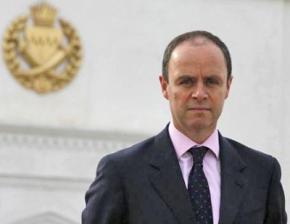Making the cars race on time in Bahrain
Belfast Telegraph columnist explains how the Bahraini monarchy got advice from a former London police official in how to carry out repression.
FORMER METROPOLITIAN Police Deputy Commissioner John Yates says he feels safer in Bahrain these days than in London, which isn't surprising, Bahrain being a couple of thousand miles away from the phone-hacking scandal.
Yates is employed in Bahrain as chief adviser on policing to King Hamad bin Isa al-Khalifa, whose Sunni regime has been under pressure since February last year when the Arab Spring dawned briefly on the tiny (population 600,000) Gulf state.
Citizens, mainly from the majority Shia community, took to the streets demanding elections, free speech, an end to arbitrary arrest and torture, and the removal of the Al-Khalifa entourage, which sucked up and splurged out almost all of the state's oil revenue. Bahraini forces cleared the protestors in short order, killing seven.
In March, as protests and violent repression continued, more than a thousand Saudi troops, invited in by al-Khalifa, marched over the border and succeeded in imposing order on the capital Manama. In the mainly Shia villages in the hinterland, however, pro-democracy demonstrations have continued--and continue routinely to be met with beatings, tear gas, house raids and gunfire.

Last year's security problems forced cancellation of the inaugural, hyped-to-the-heavens Bahrain Grand Prix race, greatly to the chagrin of al-Khalifa, who had believed the event would help fast-track his fiefdom to the front rank of nations. The 2012 race did go ahead last weekend--with Yates of the Yard the key figure providing reassurance there's no need for nervousness.
Earlier in April, Yates wrote to Jean Todt, boss of the Formula One race licensing body, the International Automobile Federation, saying that "the significance of the ongoing demonstrations should not be overplayed. These are not lawful protests but...criminal acts being perpetrated [by] people intent on causing harm to the communities in which they live. They are not representative of the vast majority of delightful, law-abiding citizens that I see every day."
Not the latest flowering of the Arab Spring, then, but a containable outbreak of Tottenham High Road-style hooliganism, of no significance for stability, or the security of the planned billion-dollar auto race.
Last week, Amnesty International offered a different take:
No one should be under any illusions that the country's human rights crisis is over. The authorities are trying to portray the country as being on the road to reform, but we continue to receive reports of torture, and the use of unnecessary and excessive force against protests.
Bernie Ecclestone, Mr. Todt's other half in the Formula One duopoly, is in no doubt which version was more credible: "I know John Yates as a highly respected copper. I take his word."
YATES TOOK up the Bahrain post after resigning from the Met last July on threat of suspension by the Independent Police Complaints Commission, four days after Neil Wallis, former executive editor of the News of the World, was arrested on suspicion of involvement in phone-hacking.
Two years earlier, Yates, in his capacity as chief investigator of the News of the World scandal, had announced that his inquiries had found no substance in a Guardian story that phone-hacking at the News International title had been routine and systematic.
There was no need therefore, Yates concluded, to trouble News International executives further.
It quickly emerged that Yates and Wallis had been meeting regularly for lunches and dinners at the Ivy Club, Marco Pierre White's Luciano, Daniel Boulud's Bar Boulud and other upmarket London eateries.
Yates has explained to the Leveson Inquiry, via video-link from Bahrain, that this relationship played no part in the Met giving Wallis a public relations consultancy or bestowing other favors on senior News International employees, nor had it impacted at all on his investigations.
Yates will have had a chance to chew over these colorful events in February when another chum of the News International bosses, Tony Blair, visited al-Khalifa, at that time hosting talks with Palestinian Authority President Mahmoud Abbas.
Maybe the pair discussed the piquant circumstances whereby Blair's old sidekick Ecclestone had himself become something of a big noise with the Bahraini elite. Bernie had starred in one of the first juicy stories of Blair's stint as prime minister, having bunged the Labour Party a million pounds at the same time as Blair agreed to exempt Formula One from a proposal to ban tobacco advertising in sport. When the arrangement was publicized, Labour paid the money back.
Now Bernie, Blair and Yates of the Yard have all fetched up in Bahrain, in various ways enhancing the prestige and strengthening the hold of al-Khalifa, while the mass of the people seethe with anger and yearn for Spring.
First published at the Belfast Telegraph.


